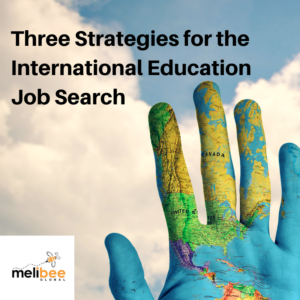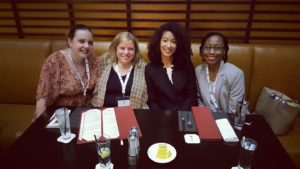 I’m just back from the Diversity Abroad conference that took place in Miami and still on a high from the community that I encountered there. Many were students and volunteers who are seeking jobs and I really appreciated the various conversations around how they plan to approach their job searches.
I’m just back from the Diversity Abroad conference that took place in Miami and still on a high from the community that I encountered there. Many were students and volunteers who are seeking jobs and I really appreciated the various conversations around how they plan to approach their job searches.
In these conversations, and those with hundreds of others over the years that I’ve been a cross-cultural career coach, I witness patterns that are common to job seekers who are eager to break into the field of international education (or a cross-cultural career). These patterns of behavior are often related to HOW to approach the resume and cover letter and are typically taught to the job seeker through career services advising. Sadly, they are formulaic in a way that typically does not yield an international education or cross-cultural career candidate getting past the first round of application, which is often the on-line application. I’ve had people contact me for coaching or participation in the International Education Career Academy (IECA) asking “what they’re doing wrong” as they’ve submitted dozens of resumes into countless job application systems and heard nothing.
Silence. It is deafening.
When I ask them to send their resume along for me to peek at, I quickly identify the primary issue – they’re following a formula that isn’t specific to international education and cross-cultural careers. They don’t know the formula they SHOULD be following, so HOW could they follow it? Thankfully, this is exactly what I teach – a methodology that has yielded an interview rate of more than 90% for those who use it.
And the good news is that it really is simple.
While I obviously can’t teach you weeks of strategy in one short blog post, I’ll instead offer three strategies that will serve anyone seeking a job in international education or across cultures. To do so most effectively, I’ll start with the myths that you’re taught early on about how to apply for jobs – then offer some of the IECAmethodology to get you back on track!
1) MYTH: You must put every achievement on your resume.
IECA METHODOLOGY: This is incorrect. When we offer everything we’ve ever done in any field or experience on our resume, it can distract the resume reviewer/hiring committee from seeing the achievements and skills that are actually germane to the job posting and need in the organization. For example, I worked in a global relocation company as a Human Resource consultant for several years. I even created an in house training program that won a state of Connecticut “Gold” award in business, which is highly competitive. If I expanded this section of my resume (which I could easily do with 10 bullets or more) for a job posting in higher education that did not have to do with Human Resources (HR), I’d take away space that could have been used for more specific, nuanced bullets around my extensive work in international education. Expanding my work in global relocation would distract the reader, making them think that I’m a great global HR consultant, but perhaps not as focused on international education as it relates to their specific needs. So while I’m extremely grateful for a career in global HR consulting, I would keep it short and sweet on my resume and focus on my experiences (paid or unpaid) in international education. This helps the reader focus on the more relevant skills and achievements related to their job posting, not my need to be proud of work in my past that is much less in alignment with their needs.

2) MYTH: Your cover letter must be professional and ultra-serious in tone.
IECA METHODOLOGY: Professional, yes, but ultra-serious…not always. There are many factors that affect how to approach a cover letter. The first is the type of job you’re applying for. An application for a Designated School Official (DSO) position in an International Student and Scholar Office will be a more serious cover letter than one for a Campus Programming Position in Student Life at a university. How so? A DSO position will speak to a deep understanding of the Code of Federal Regulations and the consequences for stakeholders when not following the letter of the law while the Campus Programming Position will speak more comfortably to the human experience of participation in programming on campuses and the positive outcomes of students who engage in them. What will both do that is less traditionally serious and highly impactful? Both should, according to the IECA methodology, open with a short story about the WHY of the writer of the cover letter. WHY do you care about this field? What experience in your life impacted you so deeply that you have chosen this as a career path? Remember that the cover letter is intended to HUMANIZE the resume. The resume is designed to illustrate skills/experiences (paid OR unpaid) and to provide a timeline of where you’ve been. The cover letter is what shows WHO you are as a person, what motivates you, and what skills you can bring to the job posting (vs. solely focusing on all you have done in the past). The biggest mistake I’ve seen in cover letters for international education and cross-cultural positions is that they follow standard formats that repeat the highlights of the resume. It is boring for the reader and will quickly get you booted out of the candidate pool. After all, if you can’t hold the hiring committee’s attention in writing, how will you hold it in person?
3) MYTH: You must be young to land a job in international education or across cultures.
IECA METHODOLOGY: While there is definitely age-ism in this country, I never discourage anyone who has relevant skills or a serious drive to consider working toward a job in the field of international education or across cultures. Those of us over 40 often think we’re not going to be seen, but the reality is that the initial round of applications is screened through a machine first and the machine is looking for relevant keywords and keyword strings related to the job posting. If you can master this (and we teach you how to do so in the IECA), you’ll have a good chance of being invited to an initial interview. When you are at the interview phase, it is critical to stand out against the competition. What those who don’t see themselves as “young” forget is that wisdom and experience are differentiators! If you work in international admissions, being older is an advantage as age and wisdom are deeply respected across many other cultures. If you interface with parents, you may have an advantage in that you’re not perceived by nervous parents as “too young” when compared to someone directly out of school. Ultimately, it comes down to your experience, skills, and how you strategically present yourself. The one area that those of us with a few small lines on our faces can often lose points in the hiring process on is technology. It is critical to show that you can go “toe to toe” with the best of younger generations when it comes to social media, open source tools, and reporting tools. You’ll notice that job postings list a need for more of these skills, so head to your local library for free or low cost classes on the latest technology OR jump over to YouTube where you can find countless tutorials.
The international education and cross-cultural career job search can be daunting when you don’t have a specific strategy. If you’re seeking one that is affordable and that yields results, do join us for the next IECA. Be in touch if you have any questions about the IECA or your career path – coaching is one of the greatest joys of my work across cultures, so I look forward to hearing from you!
